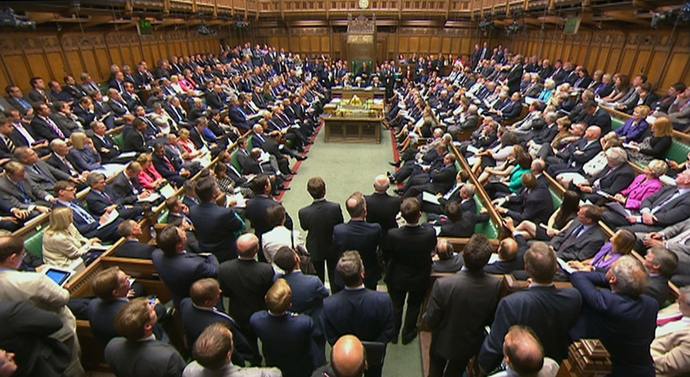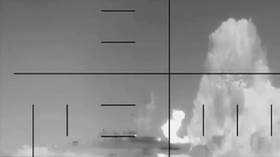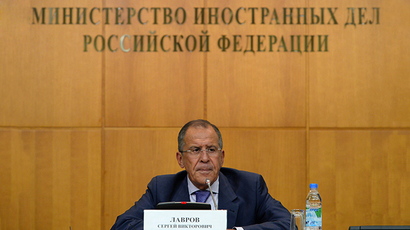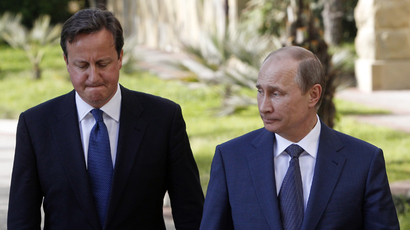Politicians enraged that Britain gave export licenses to sell Syria 'nerve gas chemicals'
MPs demanded an explanation from government ministers Monday after finding out that the UK granted licenses to export chemicals to Syria that could have been used to produce nerve gas. The licenses were granted on the eve of the Syrian civil war.
Export licenses for sodium fluoride and potassium fluoride were granted in January 2012, in the full knowledge that both substances “could also be used as precursor chemicals in the manufacture of chemical weapons,” according to a report published by the House of Commons Committee on Arms Export Controls in July.
Angus Robertson, a Scottish National Party MP, told RT that the
issue was raised in the House of Commons during defense questions
on Monday after unrest surrounding the issue bubbled over the
weekend.
“Defense ministers had to explain why it was that the UK would
even consider granting an export license,” he said, adding
that it was "impossible to tell" whether rebels could
have got hold of the chemicals should they have made it into the
country.
Both sodium fluoride and potassium fluoride are capable of being
used in the production of sarin, a neurotoxic gas. Large doses of
sarin can lead to paralysis, loss of consciousness, convulsions
and respiratory failure, eventually resulting in death.
“This is why they are included on the Australia Group chemical
weapons precursors list and are listed in Annex I of Council
Regulation 428/2009, meaning a licence is required for their
export from the EU,” the report said.
In the 1950s, the US and the USSR produced sarin gas for military purposes, and Syria has fallen under suspicion of owning Soviet-made supplies. US Secretary of State John Kerry alleged on Sunday that it was used in the attack in the eastern Damascus suburb of Ghouta on August 21 in which several hundred people were thought to have died. The accusation came as the UN is still far from finishing testing the samples they collected at the site of the alleged attack.
On Monday, the British government gave an explanation as to why
an export license was granted for the passage of chemicals that
were supposedly bound for a company based in Syria.
“We issued licenses for sodium fluoride and potassium
fluoride. The exporter and recipient company demonstrated that
the chemicals were for a legitimate civilian end-use, which was
for metal finishing of aluminum profiles used in making aluminum
showers and aluminum window frames,” Oliver Fry, a
spokesperson from the UK’s Department for Business, Innovation
and Skills, told RT via e-mail.
It remains unclear exactly who was to receive the shipments as
the company they were being supplied to has stayed anonymous.
“I’m still concerned, however, as the chemical licenses were
issued at a time when the situation in Syria had already
deteriorated,” said Robertson.

However the shipment never reached the Arab
country.
“The export itself did not take place, so the chemicals did not make their way to Syria,” Robertson said. “The UK rescinded the export licenses when the EU told the UK to do it... Frankly the problem is that the UK was prepared to grant to an export license in the first place.”
The EU later imposed new sanctions, with licenses being revoked
in July 2012.
“The sanctions included prohibitions on the sale, supply,
transfer or export of certain dual-use items and chemicals
(including sodium fluoride and potassium fluoride) which might be
used for internal repression or in the manufacture of items which
might be used for internal repression,” the House of Commons
Committee on Arms Export Controls report stated.

The potential of the chemicals is undisputed.
“Fluoride is key to making these munitions,” Professor
Alastair Hay, an expert in environmental toxicology at Leeds
University, told the Daily Record on Sunday. However, it is
unknown whether they were a contributing factor.
“Whether these elements were used by Syria to make nerve agents is something only subsequent investigation will reveal,” Hay said.
UK government 'hypocritical' on Syria
The dichotomy between UK claims and actual practice were highlighted by Mark Bitel of the Campaign Against Arms Trade (Scotland). “The Government is hypocritical to talk about chemical weapons if it’s granting licences to companies to export to regimes such as Syria,” he said.
“We saw David Cameron, in the wake of the Arab Spring, rushing off to the Middle East with arms companies to promote business.”
MP Angus Robertson echoed the sentiment on Monday.
“There’s also a parallel development,”
he told RT. “Ministers are having to acknowledge that the UK
trained senior Assad military officers in the UK over a number of
years. Now, both of these cases show to me an utter inconsistency
on the basis of decisions that have been taken here in
London.”
He added that the UK had a dubious track record in
providing potentially lethal equipment overseas.
“The UK has form in this sort of thing – being prepared to sell military hardware and other things that can be used for the production of weapons, and in this case chemicals which could – in circumstances – be used to produce chemical weapons. And we do have to ask ourselves why with the situation already having deteriorated so badly that the UK was even prepared to grant an export license where these chemicals do have a potential dual use. Yes, for manufacturing purposes, but also for the production of chemical weapons,” said Roberstson.














